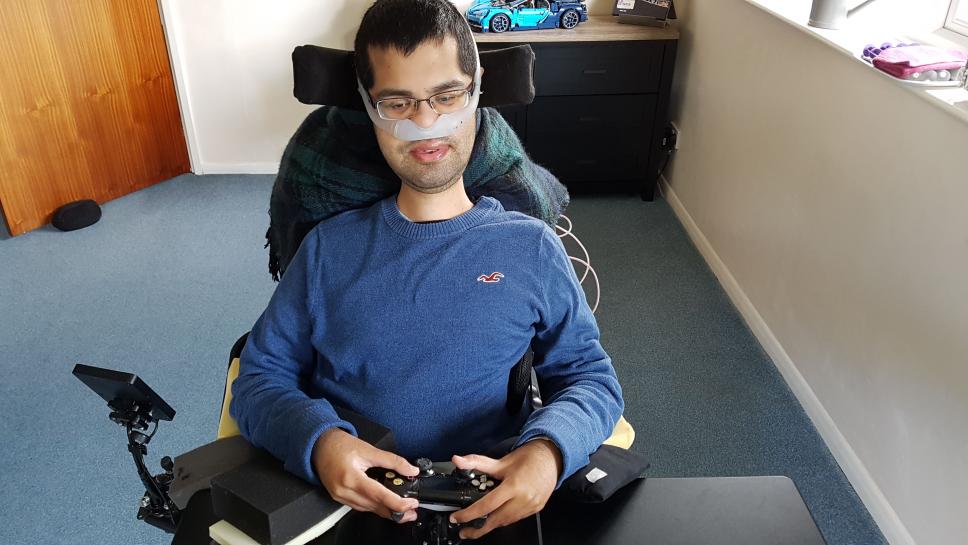
I’ve always been a gamer. When I was seven my cousin had a Super Nintendo and since then, I’ve loved it. I think I became a ‘proper gamer’ when I was about 14.
At the time, I was struggling with the mental impact of living with a disability. My mum suggested I find a hobby I could do on my own and that wasn’t very active. Because of my disability I was stuck in bed for about two years, and gaming really helped me cope.
I was nine when I was first diagnosed with Duchenne muscular dystrophy. Before that, I’d been misdiagnosed with polymyositis, so I was made to walk everywhere and have steroids. It was really bad because no one knew what was wrong with me. I hated walking because I was tired all the time.
Getting the right diagnosis helped, especially as I got a wheelchair. But it was difficult finding out my condition isn’t curable. It was very hard as it meant the future I imagined wasn’t going to come true.
However, I had more of a future than I knew about. I just had to get a new one.
A new future – working as a gaming accessibility consultant
Through Muscular Dystrophy UK, I was introduced to Microsoft and I realised I wanted to work on accessible gaming and technology.
I now campaign for disability charities and I’ve done a lot of writing about accessibility and gaming. I’ve also facilitated game accessibility workshops and have given a talk about my own experience and what works for me.
There has been a massive shift when it comes to accessible gaming. It’s starting to become an important part of game design.
A lot of my work involves talking to game developers or other accessibility consultants. We discuss ways of improving game accessibility. There's a lot of learning that goes on. We share innovation and ideas. There's also a gaming conference that happens twice a year, where developers tell us about what they’ve done and what we think.
I enjoy feeling like I’m making a difference. I love gaming, but I never seem to have time to actually play games – I’m busy working!
Everyone should be able to game
There has been a massive shift when it comes to accessible gaming. About five years ago, there wasn’t anything on accessibility. Now, it’s starting to become an important part of game design, which is fantastic.
A lot of issues can be resolved or prevented if game designers have accessibility in mind from the outset. All the developers seem to be talking to each other about accessibility. It’s not just one company, it’s a lot of companies which is a positive change.
Before I became aware of accessibility options, I thought the only thing I could do was give up gaming. I had a PS4 controller that was heavy and difficult to use. I couldn’t continue gaming.
My mum saw I was becoming depressed and unhappy. Now I realise I didn’t have the right kind of controller. I went to the charity Special Effects, who gave me a lighter controller so I was able to play. Now, through my campaigning, I have worked with Microsoft on accessible controllers and making gaming more inclusive.
Accessibility improves my life and connects me to the world
I have realised how important gaming is for my mental health. It’s not just for fun. It’s helped me to enjoy myself and forget my worries. It allows me to do things I can’t in real life, like exploring or going up mountains. It has been so helpful for me.
A lot of my friends with the same condition just end up stopping gaming. I want people to know that it is possible to carry on.
It is important to have a voice and also to be happy. I’ve worked really hard to be happy.
Accessibility is important because without accessibility and technology I wouldn’t be able to do my work or even the stuff I enjoy, like watching a series on the computer or reading comic books. I can’t ever imagine life without that. Without accessibility, I wouldn’t enjoy life as much. It’s a core part of my life and means I can be connected to society when I don’t go out as much.
Disabled voices need to be heard
It’s very important that people can feel like they are contributing. Having people talking about their experiences and different disabled people sharing their stories is really helpful. It makes it more mainstream and helps by just being open about disability. I think it would be good to help people feel more part of the world.
Sometimes you don’t feel like the world was designed for you, but I think talking about your experiences can help change that.
I used to feel like I won’t be able to do a lot. But I want people to know that it is possible to feel valuable in society and be confident about their abilities. People want to know about their experiences.
Growing up, I thought nobody would care about my experience, so I didn’t say anything. But it is important to have a voice and also to be happy. I’ve worked really hard to be happy.
Our ‘Spotlight’ series is shining a light on the experiences of people within the muscle-wasting community. Explore more of our blogs or get in touch to share your story.
